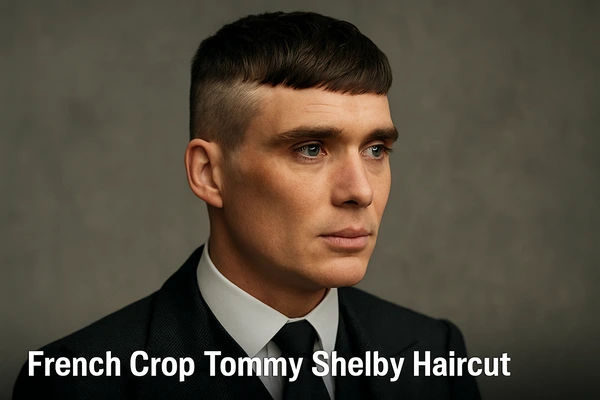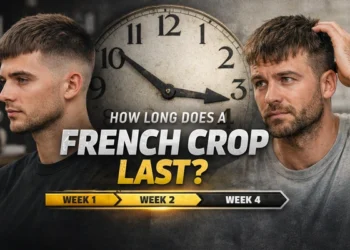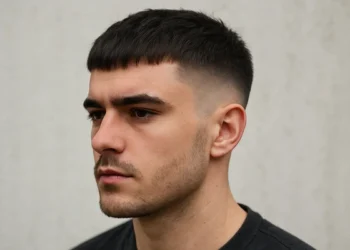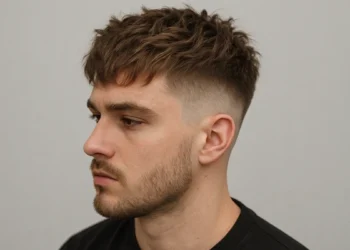The French Crop Tommy Shelby haircut is one of the most recognisable styles in modern pop culture. Popularised by Cillian Murphy in the hit series Peaky Blinders, this haircut blends historical authenticity with timeless appeal. It combines a textured French crop on top with short sides that resemble a disconnected undercut, making it a versatile choice for men seeking a sharp yet rugged look.
In this guide, we’ll explore:
- What the French crop Tommy Shelby haircut is
- How it connects to Peaky Blinders history
- Key features and variations (low fade, textured, and modern versions)
- How to get and maintain this style
- FAQs about this iconic haircut
1. What Is the French Crop Tommy Shelby Haircut?
The French crop Tommy Shelby haircut is a short textured crop with the fringe combed forward. The sides are usually shaved or cut very short, creating a stark contrast with the top. While the French Crop is a classic European style, Tommy Shelby’s version adds a 1920s gangster twist—sharp, practical, and battle-ready.
Key Features:
- Short to medium-length top (2–3 inches)
- Blunt fringe combed forward
- Disconnected or undercut sides
- Matte, textured finish (often styled without shine)
This cut suits most face shapes—oval, square, and heart-shaped faces look especially good with it.
2. Historical and Cultural Significance
The 1920s Birmingham Influence:
In Peaky Blinders, the haircut mirrors real gang culture from post-World War I Birmingham, UK. Cropped hair was practical for soldiers returning from war and symbolised toughness and working-class resilience.
Tommy Shelby’s Role in Popularising It:
Cillian Murphy’s portrayal of Tommy Shelby turned the haircut into a modern fashion phenomenon. After the show’s release, barbers worldwide reported increased demand for Peaky Blinders haircuts—with the French crop being the most requested.
3. Variations of the French Crop Tommy Shelby Haircut
While the show depicts a traditional version, barbers have adapted it to modern trends:
a. Textured French Crop
Adds heavy layering for a messier, more rugged appearance—ideal for thick or wavy hair.
b. Low Fade French Crop
Integrates a subtle taper or fade on the sides for a cleaner, modern finish.
c. High Disconnected Crop
Keeps sides very short or skin-faded, maintaining a dramatic contrast with the longer top.
d. Curly or Wavy Versions
For men with natural curls, the crop can be adapted with minimal styling, enhancing texture and volume.
Read More: French Crop Wavy Hair
4. How to Get the Tommy Shelby French Crop Haircut
1. Consult a Barber Familiar with the Style
Show reference photos from Peaky Blinders to ensure accuracy.
2. Specify the Details
- Length on top: 2–3 inches
- Fringe cut blunt and pushed forward
- Sides: either shaved (undercut) or faded (low/mid fade options)
3. Styling Tips
- Use matte clay or pomade for texture.
- Comb forward or tousle with fingers for a natural look.
- Avoid shine; the appeal lies in its understated, rugged vibe.
5. Maintenance and Care
- Trims every 3–4 weeks to keep sides sharp.
- Use a texturising powder or clay for daily styling.
- Shampoo less frequently (2–3 times weekly) to retain natural texture.
6. Who Does It Suit Best?
- Face Shapes: Oval, square, and heart-shaped
- Hair Types: Straight, wavy, and slightly curly
- Lifestyle: Minimal upkeep, stylish yet professional
7. Related Haircuts
- Buzz Cut with Fade – For an even shorter variation
- Undercut Crop – More dramatic contrast on sides
- French Crop Low Taper – A softer modern blend
FAQs
Q1: Is the Tommy Shelby haircut just a French crop?
A: It’s a variation of the French crop, but with a disconnected undercut for a harsher contrast, reflecting 1920s gang styles.
Q2: Does the French crop Tommy Shelby haircut suit curly hair?
A: Yes, but barbers may texturise curls for a more controlled fringe.
Q3: Is this haircut professional enough for work?
A: Absolutely—opting for a low fade instead of a harsh undercut makes it office-appropriate.
Q4: How do I ask my barber for the Tommy Shelby style?
A: Request a textured French crop with short undercut sides and forward fringe. Show a picture for clarity.








